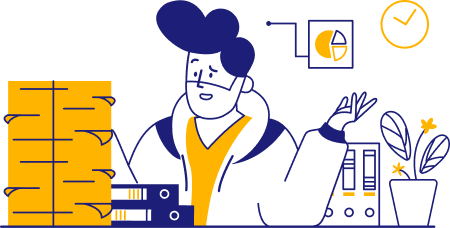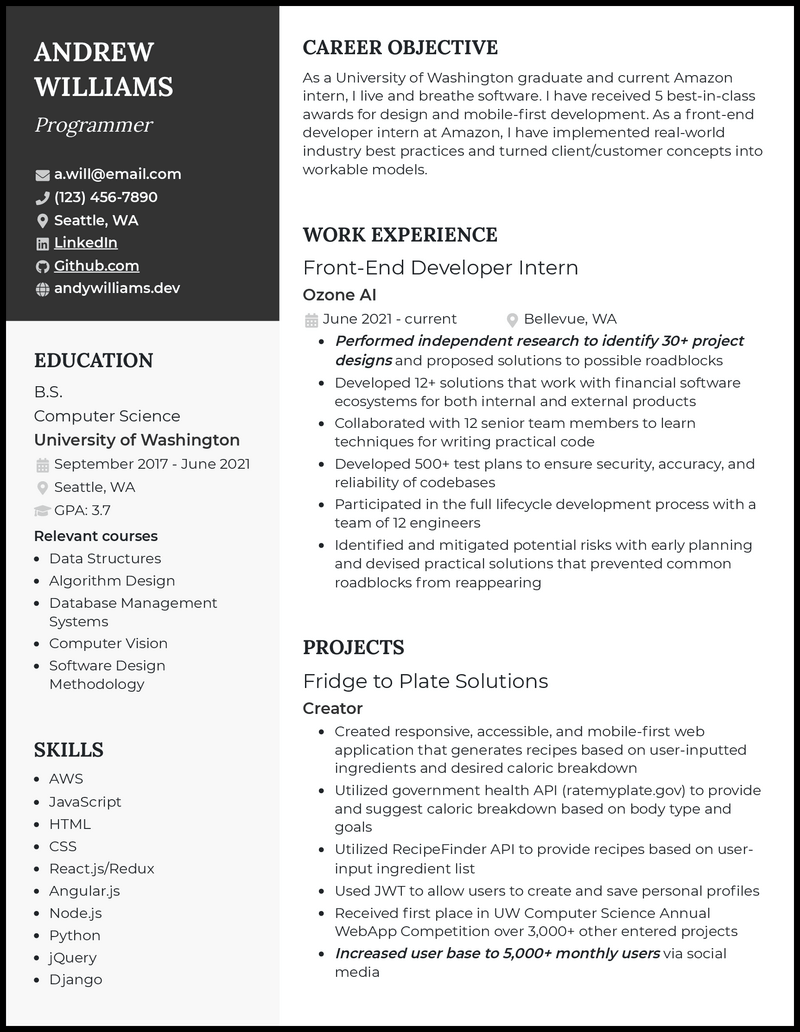As an entry-level programmer, you’re used to the ebb and flow of writing code, testing it, and then going back to fix the things that didn’t work. You’re capable of turning a mere idea into a working piece of software, and that’s a highly desirable skill.
Despite your coding abilities and growing list of projects, building a resume and writing an effective cover letter for this role can seem intimidating when your professional experience is still limited.
If you’re feeling a little at a loss, don’t worry—that’s what we’re here for. Our entry-level programmer resume templates helped thousands of budding devs get their foot in the door. Follow our resume tips to advance in your career!
Related resume examples
What Matters Most: Your Programming Skills & Past Projects

Writing code takes a lot of skill, be it a knack for logical reasoning or the patience to deal with hours of debugging and problem-solving. More than anything, it takes drive and passion for coding.
You’ve shown those traits time and time again while learning your programming languages of choice, and now, it’s time to display them in a way that captures the attention of recruiters.
In order to succeed, list your programming languages and the frameworks you’re proficient in, such as JavaScript and Angular.
Next, talk about database-related skills, such as MySQL, and any relevant IDEs. Adjust the list of skills below to match your industry; for example, a back-end dev might toss out React and Angular and instead add Python and C++.
9 best entry-level programmer skills
- Visual Studio Code
- JavaScript
- HTML/CSS
- Angular.js
- jQuery
- React.js
- MySQL
- Git
- REST APIs
Sample entry-level programmer work experience bullet points
The “work experience” part of your resume is where you can elaborate on your skills and really make them shine.
To show your impact, talk about your programming projects, and rely on metrics to tell the tale. Don’t just say that you worked with React, but dive deeper and explain the actual benefits of your work.
For example, if you optimized a website for mobile devices, and your work was able to increase the overall traffic by 14%, make sure to include that in your resume.
To further drive this point home, remember to mention the programming languages and tools you used when working on those projects.
Here’s how to make the most of your past experience:
- Developed 200+ test plans to ensure security, accuracy, and reliability of codebases
- Utilized HTML, CSS, JavaScript, and React to create a fully-functional e-commerce website, receiving a 5-star rating from the client
- Developed and tested REST APIs using Postman, which resulted in a 7% increase in back-end application efficiency
- Participated in code weekly reviews in a team of 8 developers, improving code quality by 23% and readability by 14%
Top 5 Tips for Your Entry-Level Programmer Resume
- Advertise your projects
- Technical recruiters often review your projects and check out your code before contacting you, so add a portfolio to your resume. This can just be your GitHub repository or a personal website you coded yourself.
- Show that you appreciate feedback
- Taking feedback from senior devs is the bread and butter of a junior programmer’s life. Emphasize that you’re happy to listen, talk about participating in code reviews with more experienced colleagues or the way mentoring helped you write better code in JavaScript.
- Tweak your resume for each job
- Make sure to tweak your work experience, coding skills and tools, and projects to closely match the company you’re applying to. This will help you stand out among other applicants.
- Don’t be afraid to get technical
- The more you underscore your knowledge of coding, the better. Do this by listing relevant skills and tools that you often use, be it Python or React. This list will vary based on whether you’re a front-end or a back-end dev, but always make sure it’s highly relevant to your role.
- Every project counts
- You don’t need professional programming experience to be a programmer. If your past work experience is unrelated to coding, fill your resume with descriptions of your own projects, such as a fully responsive website or a quiz app.
Not every company asks for it, but going the extra mile is always a good idea when applying for entry-level programming jobs. Ensure that your cover letter directly addresses the job description and refers to your resume.
A good project is one you’re proud of, but also one that has clean code written in the languages and/or frameworks that are needed for the job. Try to think outside the box—instead of a to-do list, perhaps you could code an interactive game or a weather application that retrieves data from an API.
Avoid being generic—the more specific you can be about your skills and experiences, the better. Instead of vague terms like “teamwork,” elaborate and talk about participating in daily Scrum meetings or coding in a group to develop a mobile app using React.








